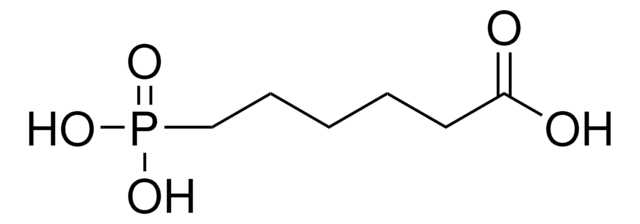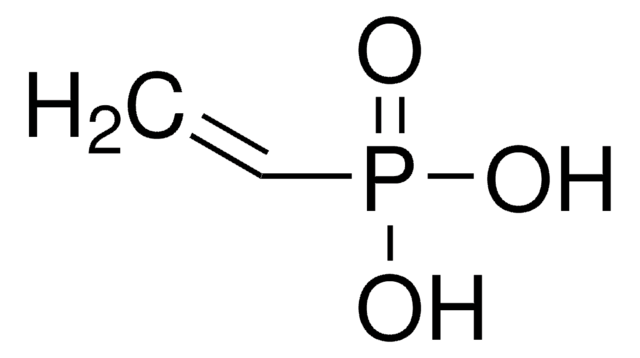745855
12-Mercaptododecylphosphonic acid
95%
Synonym(s):
P-(12-Mercaptododecyl)phosphonic acid
Sign Into View Organizational & Contract Pricing
All Photos(3)
About This Item
Empirical Formula (Hill Notation):
C12H27O3PS
CAS Number:
Molecular Weight:
282.38
MDL number:
UNSPSC Code:
12352103
PubChem Substance ID:
NACRES:
NA.23
Recommended Products
Assay
95%
form
powder
mp
92-96 °C
storage temp.
2-8°C
SMILES string
OP(O)(CCCCCCCCCCCCS)=O
InChI
1S/C12H27O3PS/c13-16(14,15)11-9-7-5-3-1-2-4-6-8-10-12-17/h17H,1-12H2,(H2,13,14,15)
InChI key
PVIUMTORLYKRJT-UHFFFAOYSA-N
General description
12-Mercaptododecylphosphonic acid (MDPA) is an organophosphonic acid that forms a self-assembled monolayer (SAM). The phosphonic groups tend to react with the metal surfaces that allow the formation of metal-oxygen-phosphonate (M-O-P) bonds that facilitate the surface with mechanical and chemical stability.
Application
MDPA based SAM can be coated on TiO2 for potential applications in the extraction of heavy metals. It can also be used in surface modification of a graphene oxide (GO) based active material for the fabrication of a organic field effect transistor (OFET).
Organophosphonic acid self-assembled monolayers (SAMs) for nanoelectronics; solid-state lighting; energy generation and nanocomposites. A mercaptoalkylphosphonate monolayer used to bind gold nanoparticles.
Signal Word
Warning
Hazard Statements
Precautionary Statements
Hazard Classifications
Eye Irrit. 2 - Skin Irrit. 2 - STOT SE 3
Target Organs
Respiratory system
Storage Class Code
11 - Combustible Solids
WGK
WGK 3
Certificates of Analysis (COA)
Search for Certificates of Analysis (COA) by entering the products Lot/Batch Number. Lot and Batch Numbers can be found on a product’s label following the words ‘Lot’ or ‘Batch’.
Already Own This Product?
Find documentation for the products that you have recently purchased in the Document Library.
Customers Also Viewed
Self-Assembled Monolayers of 12-Mercaptododecylphosphonic Acid on Titania Particles; Application to the Extraction of Heavy Metals
Antherieu S, et al.
MRS Online Proceedings Library, 847(1), 141-149 (2004)
Peter J O'Brien et al.
Nature materials, 12(2), 118-122 (2012-11-20)
Manipulating interfacial thermal transport is important for many technologies including nanoelectronics, solid-state lighting, energy generation and nanocomposites. Here, we demonstrate the use of a strongly bonding organic nanomolecular monolayer (NML) at model metal/dielectric interfaces to obtain up to a fourfold
Driving forces for the self-assembly of graphene oxide on organic monolayers
Kirschner J, et al.
Nanoscale, 6(19), 11344-11350 (2014)
Phosphonate monolayers functionalized by silver thiolate species as antibacterial nanocoatings on titanium and stainless steel
Amalric J, et al.
Journal of Materials Chemistry, 19(1), 141-149 (2009)
Hugo M Doeleman et al.
ACS nano, 14(9), 12027-12036 (2020-09-02)
Localizing light to nanoscale volumes through nanoscale resonators that are low loss and precisely tailored in spectrum to properties of matter is crucial for classical and quantum light sources, cavity QED, molecular spectroscopy, and many other applications. To date, two
Our team of scientists has experience in all areas of research including Life Science, Material Science, Chemical Synthesis, Chromatography, Analytical and many others.
Contact Technical Service










